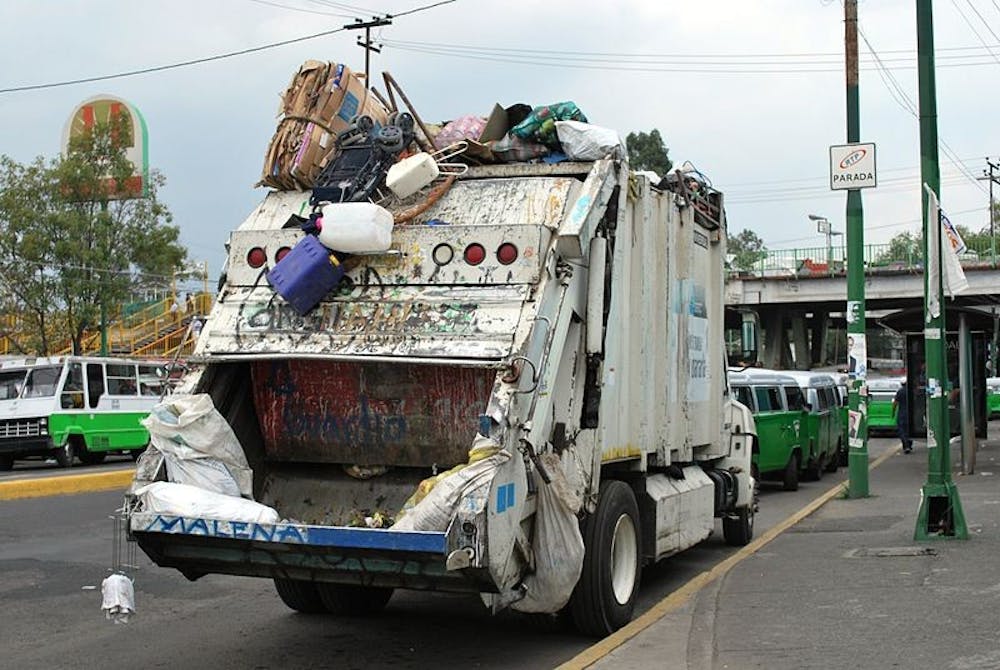
When I was young, I wanted to be a “dump truck man.” Maybe my five-year-old brain wasn’t taking the negatives of the job into account, but the appeals are obvious. First, I wouldn’t have to go to school anymore, that would be pretty sick. Adults always say they want to travel more, and on the truck I’d be traveling all day long! And do you realize how fun it would be to ride on the back of the truck? It’s like you’re getting paid to ride a roller coaster; a very stinky roller coaster. I went to the dump with my dad sometimes, so I had all the qualifications. I was ready to start immediately.
While sometimes I wish I could still be so enthusiastic about a minimum-wage job, my career goals have, luckily, progressed since my dump truck dreams in kindergarten. Of course, I fully understand now why it wouldn’t be the most desirable career for me — from its monotony, to the physical toll it would take on my body, and of course to the general disgustingness of dealing with trash day in and day out. However, when I think back on my dreams of strolling the streets of my hometown on the side of a sanitary abomination, I wonder what makes certain jobs and careers undesirable.
When I stepped into the world with my lofty trash-world aspirations, I was immediately bombarded with the idea of the American Dream. The concept that you ought to strive to improve your economic position and achieve more than your past generations is indoctrinated into us as kids long before we can put a name to it. In the real world, I think this is a relatively harmless doctrine, and maybe even marginally beneficial in some aspects. However at Hopkins, it takes on a whole new meaning.
It is undeniable that Hopkins is far more affluent than the real world. Students’ parents are likely to be doctors, lawyers, politicians or diplomats, successful businessmen and women, and other such “upper-class” careers. With the ever-present pressure of progression, a terrifyingly small number of careers are left that quench the societal desire for self-improvement. If both your parents go to a top five medical school, suddenly going to the 25th-ranked program seems like a failure. What might be the chance of a lifetime for someone who had to go to community college for two years before transferring to a four-year school because of finances, may become the bar of mediocrity for you. This expectation of consistent generational improvement prescribes fewer and fewer acceptable careers as time goes on, eventually making you feel like there is nothing you can do to be successful.
However, what is more harmful than this individual pressure to pursue a certain cluster of careers is the collective culture that stems from it, which legitimizes such a larger portion of aspirations. If all the people in your Economics class are talking about internships like its JP Morgan or nothing, your hopes of working at the Baltimore Chamber of Commerce have just been labeled as a backup option, only to be pursued if you fail at everything else. When your other Computer Science friends talk about their post-graduation jobs at Google and Facebook, maybe your dream job at a local business no longer feels legitimate.
This is something I experienced a lot during my freshman year. At the time I was thinking about teaching at the high-school or college level. I couldn’t tell people that when I left Hopkins I wanted to go teach at the generic, underfunded, Appalachian public school I graduated from when they were talking to me like they are going to be homeless if they don’t get into a top-25 medical school. So I didn’t. I hid that part of me, save a few of my closest friends, and simply told everyone else that I was planning on being an academic. But I heard again and again, “You won’t get hired unless you get into a top-25 PhD program.” At first I was doubtful of this standard. I never wanted to teach anywhere elite. But maybe the job market in academia is just that selective. My professors would know more about it than me anyways. And just like that, I succumbed to a standard that would define me as a failure unless I performed better than 95 percent of my competition.
But it’s a new year, and I once again feel like I have all the answers to solve every problem in the world, as any college student should. I can now confidently say that I am pre-law with the goal of going into public-interest law. Sure, I’ll make less than if I worked in the legal department of a Wall-Street firm. Maybe I’ll even struggle to pay off student debt. My current top choice for grad school is barely in the top-100 schools. But I like the program, and it has the right environment for my career interests. At the end of the day, I’m still going to get a legal job. Just like you will still be a doctor if you don’t going to a top-25 medical school; you will still be a successful engineer if you don’t end up at Medtronic or Google; you can still be successful as a public school teacher.
After all, if you end up in some flashy job that screams “I am successful,” but you’re miserable every time you clock in, you have achieved nothing.





